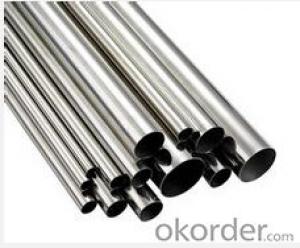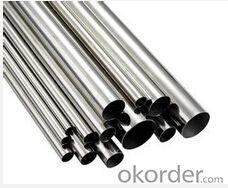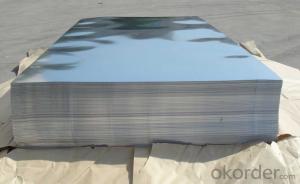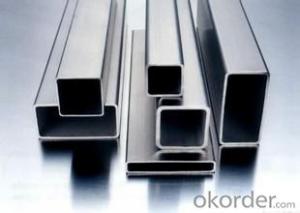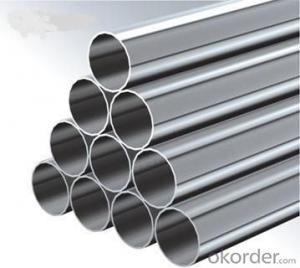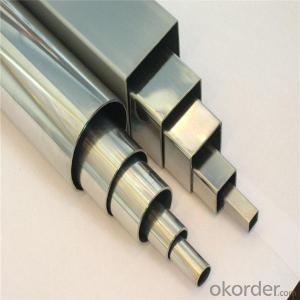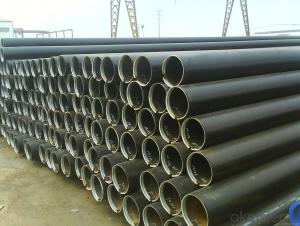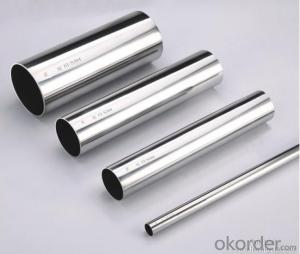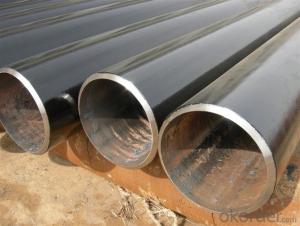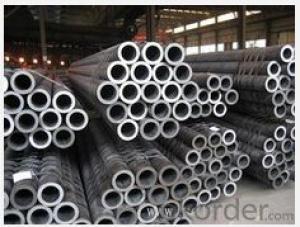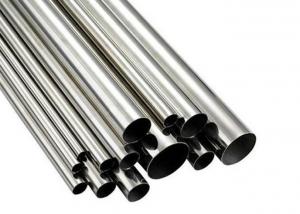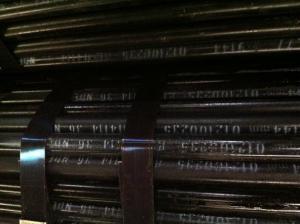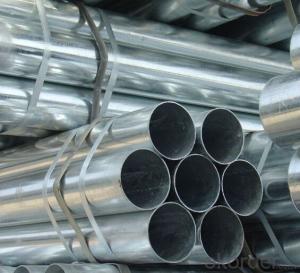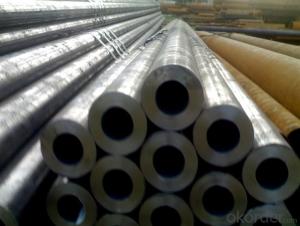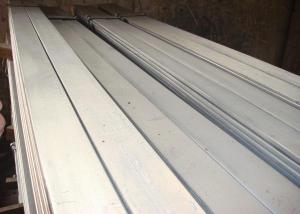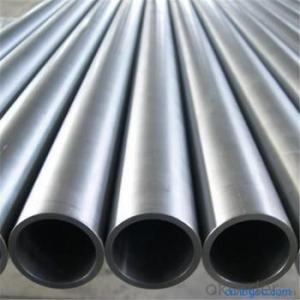Stainless seamless Steel Pipe polish round
- Loading Port:
- Qingdao
- Payment Terms:
- TT OR LC
- Min Order Qty:
- 1 m.t.
- Supply Capability:
- 5000 m.t./month
OKorder Service Pledge
Quality Product, Order Online Tracking, Timely Delivery
OKorder Financial Service
Credit Rating, Credit Services, Credit Purchasing
You Might Also Like
Specifications
material: stainless steel
size: various
packing: 1pc per plastic bag
sample time: within 7days
Material: stainless steel
Size: various
Packing: 1pc per plastic bag
Sample time: within 7days
HS Code: 7306400000
| Material | Stainless steel |
| Finish | Polish |
| Use | Frame |
| Size | Various, customized are welcome |
| Style | Round pipe, square pipe |
| Marking | according to your request |
| Payment | T/T, L/C |
| MOQ | 100PCS per Size |
| Capacity to produce | 300T per month |
| Packing details | 1pc per plastic bag |
| Delivery details | 30-35days after you confirm the order |
| Shipment | By sea, by air or DHL,UPS, Fedex |
| Port | Qingdao |
| Origin | China |
| Certificate | Mill certificate |
| Free sample time | in 7 days |
- Q: Can stainless steel pipes be used for fire sprinkler systems?
- Yes, stainless steel pipes can be used for fire sprinkler systems.
- Q: How do you calculate the pipe length required for a specific application?
- To calculate the pipe length required for a specific application, you need to consider factors such as the flow rate, pressure drop, pipe material, and the type of fluid being transported. By using equations and formulas specific to fluid dynamics, you can determine the appropriate pipe length needed to achieve the desired flow and pressure conditions. Additionally, factors like pipe fittings, bends, and elbows also need to be taken into account when calculating the overall pipe length required.
- Q: Can stainless steel pipes be used for structural purposes?
- Yes, stainless steel pipes can be used for structural purposes. Stainless steel is known for its strength and durability, making it suitable for various structural applications such as construction, infrastructure, and industrial projects. Its corrosion resistance properties also make it a preferred choice for environments that are exposed to moisture or chemicals.
- Q: Can stainless steel pipes be used for natural gas systems?
- Yes, stainless steel pipes can be used for natural gas systems. Stainless steel is highly resistant to corrosion and can withstand high pressure and temperature, making it a suitable material for transporting natural gas. The smooth inner surface of stainless steel pipes also allows for efficient gas flow, minimizing the risk of blockages or obstructions. However, it is important to ensure that the stainless steel pipes used meet the specific standards and codes required for natural gas systems to ensure safety and compliance.
- Q: What is the difference between Schedule 30 and Schedule 40 stainless steel pipes?
- Stainless steel pipes are classified into Schedule 30 and Schedule 40 based on their wall thickness and pressure ratings. The primary distinction lies in the wall thickness. Schedule 30 stainless steel pipes possess a slimmer wall in comparison to Schedule 40 pipes. Generally, the wall thickness of Schedule 30 pipes is less than that of Schedule 40 pipes. Consequently, Schedule 30 pipes exhibit a larger internal diameter than Schedule 40 pipes of the same nominal size. The pressure rating and strength of the pipes are directly influenced by the thickness of the pipe walls. Schedule 40 stainless steel pipes are engineered to withstand higher pressure and exhibit greater structural integrity as a result of their thicker walls. They find common usage in industrial settings or for plumbing systems in commercial buildings that involve the transportation of high-pressure fluids or gases. Conversely, Schedule 30 stainless steel pipes are typically employed in applications with lower pressure requirements. They are suitable for situations where more moderate pressure demands exist or where the transported fluid does not necessitate a higher pressure rating. To summarize, the primary disparity between Schedule 30 and Schedule 40 stainless steel pipes resides in their wall thickness. Schedule 40 pipes possess thicker walls and higher pressure ratings compared to Schedule 30 pipes. The choice between the two depends on the specific requirements of the application, including the pressure and nature of the transported fluid.
- Q: Why can't stainless steel tubes be cut with acetylene?
- Is mainly from Huoxian, heating flame is mainly open before cutting and cutting plate preheating on the auxiliary heating.Stainless steel, chromium containing at least 13% or more, it hinders the exothermic oxidation and melting phenomenon, which is higher than that of iron chromium to 316 degrees, 1855 degrees, so can not use stainless steel oxygen - acetylene flame cutting.
- Q: Can stainless steel pipes withstand high temperatures?
- Stainless steel pipes are renowned for their remarkable ability to resist heat and endure extreme temperatures. The temperature capacity of stainless steel pipes relies on the specific grade employed. Typically, stainless steel pipes retain their structural integrity even at temperatures as high as 1200°C (2192°F). Furthermore, these pipes possess exceptional resistance to corrosion, rendering them ideal for industrial settings that involve both high heat and corrosive surroundings, such as chemical processing plants, power generation facilities, and automotive exhaust systems.
- Q: Can stainless steel pipes be used for pharmaceutical storage tanks?
- Yes, stainless steel pipes can be used for pharmaceutical storage tanks. Stainless steel is a preferred material in the pharmaceutical industry due to its high corrosion resistance, durability, and ability to maintain cleanliness. It is non-reactive, which helps prevent contamination of the pharmaceutical products stored in the tanks. Stainless steel pipes also offer a smooth and easy-to-clean surface, making it suitable for maintaining the required hygiene standards in pharmaceutical storage. Additionally, stainless steel is resistant to extreme temperatures and can withstand the rigorous cleaning procedures commonly used in pharmaceutical facilities. Thus, stainless steel pipes are commonly used in the construction of pharmaceutical storage tanks to ensure the safety and integrity of the stored pharmaceutical products.
- Q: Are stainless steel pipes suitable for fertilizer production?
- Yes, stainless steel pipes are suitable for fertilizer production. Stainless steel pipes offer a number of advantages that make them a preferred choice for use in the fertilizer industry. Firstly, stainless steel pipes are highly resistant to corrosion, which is particularly important in the production of fertilizers. Fertilizer production involves the use of chemicals and substances that can be highly corrosive, such as ammonia, sulfuric acid, and phosphoric acid. Stainless steel pipes can withstand the corrosive effects of these substances, ensuring the integrity and longevity of the piping system. Additionally, stainless steel pipes have excellent strength and durability, making them able to withstand the high pressures and temperatures often encountered in fertilizer production processes. This ensures the safe and efficient transportation of the fertilizer materials within the production plant. Furthermore, stainless steel pipes are hygienic and easy to clean, which is crucial for maintaining the purity of the fertilizer products. Stainless steel has a smooth surface that resists the buildup of bacteria, dirt, and other contaminants, ensuring that the pipes do not contaminate the fertilizer during production. Lastly, stainless steel is a sustainable and environmentally friendly material. It is 100% recyclable, making it a more sustainable choice compared to other pipe materials. Additionally, stainless steel has a long lifespan, reducing the need for frequent replacements and minimizing waste. In conclusion, stainless steel pipes are highly suitable for fertilizer production due to their corrosion resistance, strength, durability, hygienic properties, and environmental benefits.
- Q: Can stainless steel pipes be painted or coated?
- Yes, stainless steel pipes can be painted or coated. However, it is important to choose the appropriate type of paint or coating that is specifically designed for use on stainless steel surfaces. This is because stainless steel has a smooth and non-porous surface, which can make it challenging for paint or coatings to adhere properly. Additionally, stainless steel pipes may be exposed to harsh environmental conditions, such as high temperatures or corrosive substances, so it is crucial to select a paint or coating that is resistant to these factors. By using the right type of paint or coating and following proper surface preparation techniques, stainless steel pipes can be effectively painted or coated to enhance their appearance or provide additional protection against corrosion.
Send your message to us
Stainless seamless Steel Pipe polish round
- Loading Port:
- Qingdao
- Payment Terms:
- TT OR LC
- Min Order Qty:
- 1 m.t.
- Supply Capability:
- 5000 m.t./month
OKorder Service Pledge
Quality Product, Order Online Tracking, Timely Delivery
OKorder Financial Service
Credit Rating, Credit Services, Credit Purchasing
Similar products
Hot products
Hot Searches
Related keywords
